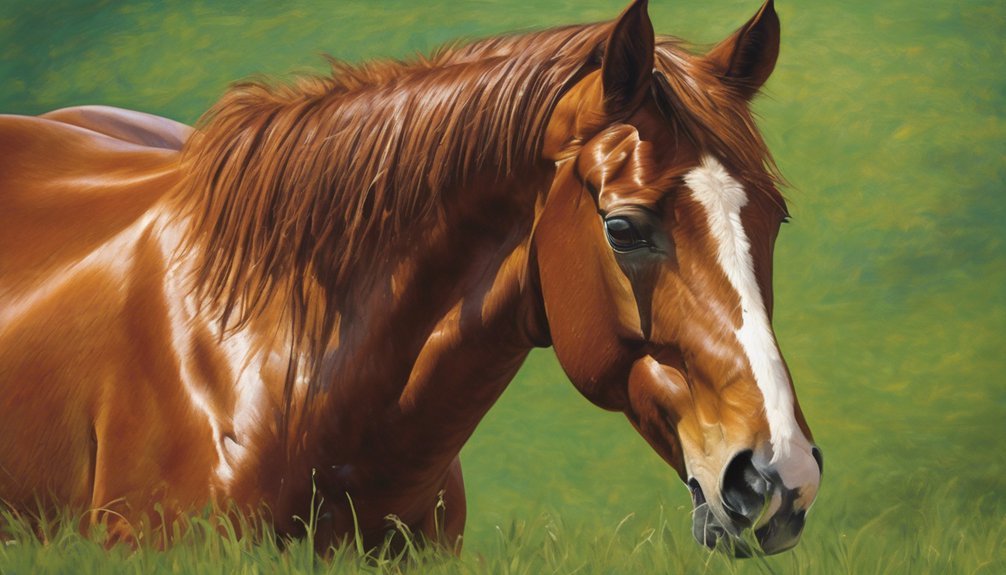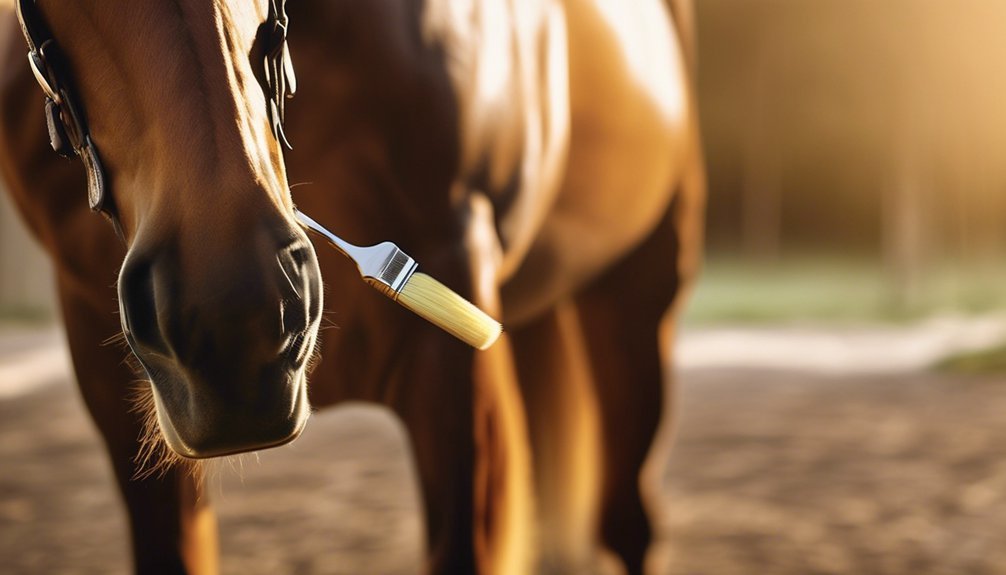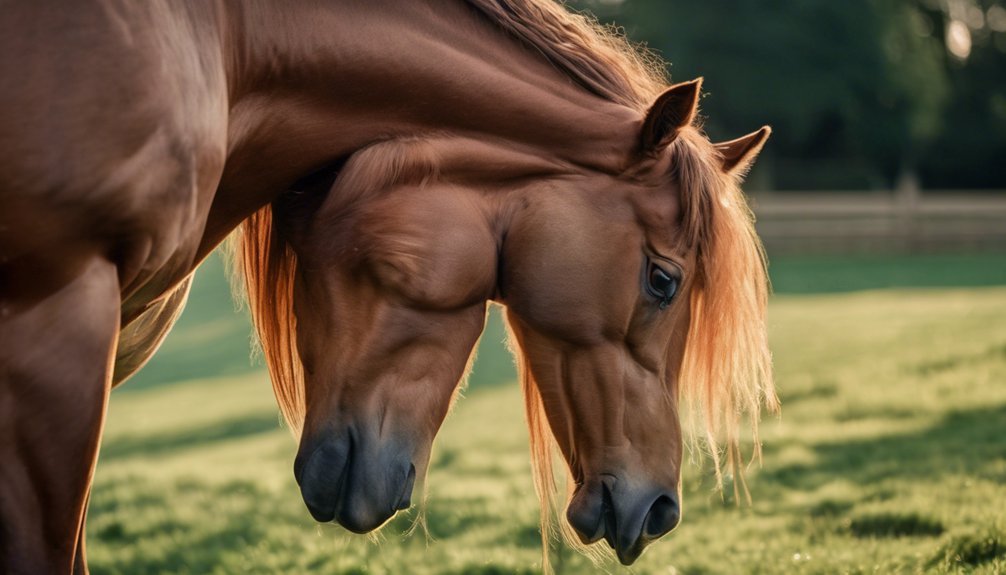
A horse's coat can be likened to a protective armor, reflecting its overall health and well-being. If you've noticed brittleness in your horse's coat, it's essential to understand the underlying factors contributing to this issue. From nutritional deficiencies to environmental influences, several aspects could be at play. By addressing these concerns, you can help restore your horse's coat to its former luster and vitality. Let's explore the steps you can take to combat this problem effectively.
Key Takeaways
- Ensure a balanced diet rich in essential fatty acids, vitamins A, E, and biotin for optimal coat health.
- Regularly groom your horse to distribute natural oils and remove debris, preventing matting and brittleness.
- Use quality grooming tools tailored to your horse's coat type to enhance effectiveness and maintain shine.
- Protect your horse from excessive sunlight exposure to prevent UV damage, and consider using conditioning products for added moisture.
- Consult a veterinarian if coat brittleness persists or if you notice skin irritations or behavioral changes.
Understanding the Causes of Coat Brittleness

When you notice your horse's coat appearing dull and brittle, it's essential to recognize that several factors could be contributing to this issue.
Seasonal changes often play a significant role, as your horse's coat adapts to temperature fluctuations. During winter, a thicker coat may become matted and lose luster, while summer can lead to sun damage.
Additionally, environmental factors such as dust, dirt, and humidity can exacerbate brittleness. You might also consider the impact of coating products; some may contain harsh chemicals that strip natural oils.
Regular grooming can help maintain a healthy coat by distributing these oils while removing debris.
Nutritional Requirements for a Healthy Coat
To ensure your horse maintains a healthy, vibrant coat, you need to pay close attention to its nutritional requirements. Essential fatty acids, such as omega-3 and omega-6, play a crucial role in promoting skin health and enhancing coat shine. Including sources like flaxseed oil or fish oil in your horse's diet can significantly improve its coat quality.
Additionally, vitamin supplementation is vital; vitamins A, E, and biotin contribute to a strong, resilient coat and support overall skin health. You might consider a balanced equine feed that includes these nutrients or consult with a veterinarian to tailor a diet specific to your horse's needs.
Grooming Techniques to Prevent Brittleness

Proper grooming is just as important as nutrition in maintaining your horse's coat health and preventing brittleness.
To keep your horse's coat supple and vibrant, focus on the following techniques:
- Grooming Frequency: Aim for daily grooming sessions. Regular brushing stimulates skin oils that promote a healthy coat.
- Use Quality Tools: Invest in brushes designed for different coat types. A soft-bristled brush can help distribute natural oils evenly, enhancing coat conditioning.
- Incorporate Conditioning Products: Use coat conditioners that provide moisture and shine. Applying these products after grooming can lock in hydration and prevent brittleness.
Environmental Factors Affecting Coat Quality
While many factors contribute to the health of your horse's coat, environmental conditions play a crucial role in determining its quality.
Sunlight exposure can significantly impact your horse's coat; excessive UV rays may lead to fading and brittleness. On the other hand, insufficient sunlight can result in a dull, lifeless coat, lacking the necessary luster.
Additionally, humidity levels are vital in maintaining coat health. High humidity can lead to mold and skin issues, while low humidity may dry out the coat, causing brittleness and flakiness.
Monitoring these environmental factors and adjusting your horse's living conditions can greatly enhance coat quality. By creating a balanced environment, you'll help ensure your horse's coat remains vibrant and resilient.
When to Consult a Veterinarian

Recognizing when to consult a veterinarian is essential for maintaining your horse's coat health, especially if you notice signs of brittleness or other abnormalities.
Ignoring these signs can lead to more severe issues down the road. Here are three key indicators that warrant veterinary advice:
- Persistent Brittle Coat: If your horse's coat remains brittle despite dietary adjustments and proper grooming, it may indicate underlying health issues.
- Skin Irritations: Look out for redness, sores, or excessive itching, which could suggest infections or allergies.
- Behavior Changes: If your horse displays unusual lethargy or discomfort, it's crucial to seek veterinary evaluation as these can relate to coat health and overall well-being.
Taking prompt action ensures your horse stays healthy and vibrant.
Frequently Asked Questions
Can Supplements Help Improve Coat Quality in Horses?
Supplements can indeed enhance coat quality in horses. You should consider types rich in essential fatty acids, biotin, and zinc, as these coat nutrients promote shine and strength, helping your horse look its absolute best.
How Often Should I Groom My Horse for Optimal Coat Health?
To maintain optimal coat health, you should groom your horse at least three to four times a week. Regular grooming frequency not only promotes coat maintenance but also strengthens your bond and enhances their overall well-being.
Does Age Affect a Horse's Coat Condition?
Yes, age-related changes significantly impact your horse's coat condition. As they age, you'll need to adjust coat maintenance routines, ensuring they receive proper nutrition and grooming to keep their coat healthy and vibrant.
What Are the Signs of an Unhealthy Coat?
Imagine a sunless day; that's how a horse's coat looks when it's unhealthy. You'll notice a dull sheen, flaky skin, and excessive shedding—clear signs that something's amiss with your equine friend's overall health.
Can Weather Changes Impact My Horse's Coat Health?
Yes, weather extremes can significantly impact your horse's coat health. Seasonal shedding may intensify, leading to changes in texture and brittleness. Ensuring proper nutrition and care helps mitigate these effects and promotes a healthy coat.
Conclusion
In conclusion, if you think your horse's brittle coat is just a fashion statement, think again! With the right diet, grooming, and environmental care, you can transform that lackluster look into a shiny masterpiece. Remember, a well-nourished horse is not only healthier but also less likely to resemble a walking hay bale. So, don't hesitate—treat your horse's coat like fine silk, or you might just end up with a horse that's more "rough" than "refined."





